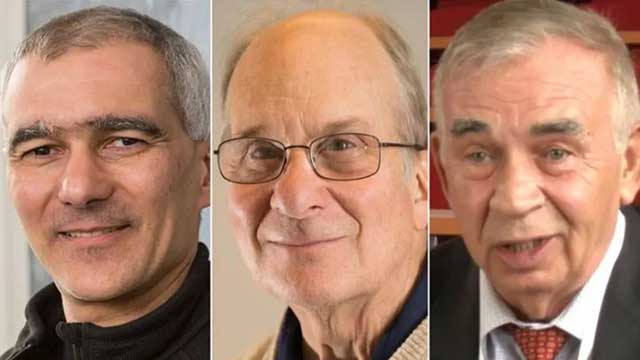The Nobel Prize in chemistry has been awarded to Moungi Bawendi, Louis Brus and Alexei Ekimov for their work on tiny quantum dots.
Quantum dots are tiny particles, just a few atoms in diameter, whose electrons have constrained movement. This effects how they absorb and release visible light, allowing for very bright colors. They are used in many electronics, like LED displays.
“These tiny particles have unique properties and now spread their light from television screens and LED lamps. They catalyze chemical reactions and their clear light can illuminate tumor tissue for a surgeon,” according to the Royal Swedish Academy of Sciences.
Hans Ellegren, the secretary-general of the academy, announced the award Wednesday in Stockholm.
The Nobel Prizes carry a cash award of 11 million Swedish kronor ($1 million). The money comes from a bequest left by the prize’s creator, Swedish inventor Alfred Nobel, who died in 1896.
THIS IS A BREAKING NEWS UPDATE. AP’s earlier story follows below.
STOCKHOLM (AP) — Swedish media reported Wednesday that the Royal Swedish Academy of Sciences may have announced the winners of this year’s Nobel Prize in chemistry prematurely.
Public broadcaster SVT said the academy sent a press release by mistake early Wednesday that contained the names of the winners.
The Associated Press did not receive the press release and has decided not to publish the names until they're confirmed.
“Unfortunately, I cannot comment on what has been published yet. What is important to know is that the Academy of Sciences has not yet met and there is no decision on who will be awarded this year’s Nobel Prize in Chemistry,” academy spokeswoman Eva Nevelius said in an email.
Heiner Linke, an expert on the Nobel Committee for chemistry, told Swedish newspaper Dagens Nyheter that no decision had been made Wednesday morning and that if a press release had gone out it would “definitely” have been a mistake.
According to SVT, the press release said the prize went to three scientists for the “discovery and synthesis of quantum dots."
The Royal Swedish Academy of Sciences, which awards the physics, chemistry and economics prizes, asks for nominations a year in advance from thousands of university professors and other scholars around the world.
A committee for each prize then discusses candidates in a series of meetings throughout the year. At the end of the process, the committee presents one or more proposals to the full academy for a vote. The deliberations, including the names of nominees other than the winners, are kept confidential for 50 years.
The prize is set to be announced at 11:45 a.m. in Sweden (0945 GMT).
On Tuesday, the physics prize went to French-Swedish physicist Anne L’Huillier, French scientist Pierre Agostini and Hungarian-born Ferenc Krausz for producing the first split-second glimpse into the superfast world of spinning electrons.
The tiny part of each atom races around the center and is fundamental to virtually everything: chemistry, physics, our bodies and our gadgets.
On Monday, Hungarian-American Katalin Karikó and American Drew Weissman won the Nobel Prize in medicine for discoveries that enabled the creation of mRNA vaccines against COVID-19.
Last year, Americans Carolyn R. Bertozzi and K. Barry Sharpless, and Danish scientist Morten Meldal were jointly awarded the Nobel Prize in chemistry for developing a way of “ snapping molecules together” that can be used to explore cells, map DNA and design drugs that can target diseases such as cancer more precisely.
The chemistry prize means Nobel season has reached its halfway stage. The prizes in literature, peace and economics follow, with one announcement every weekday until Oct. 9.
The Nobel Foundation raised the prize money by 10% this year to 11 million kronor (about $1 million). In addition to the money, winners receive an 18-carat gold medal and diploma when they collect their Nobel Prizes at the award ceremonies in December.





